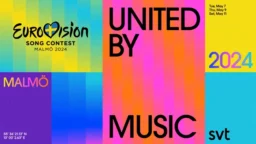Politics aren’t supposed to be a factor in the Eurovision Song Contest. But from time to time they are. For instance when a state wants to join – but isn’t recognized by some of the other European countries. Especially for Eurostory, Norwegian journalist Steinar Even Østmoe went to Pristina, to find out how important a first Kosovar entry at Eurovision would be.
RECOGNITION
Last year in Stockholm, attempting to separate politics from entertainment, the European Broadcasting Union announced that a number of regional flags would be banned during the finals. Catalonian or Scottish flags were considered too controversial because of local independence movements. The black and white flag of the Islamic state was also on the list – and then there was the flag of Kosovo, which is neither a regional flag nor a flag of a terrorist group. Needless to say Kosovars were not happy with either of the implied comparisons. Even if the decision was reversed later, it was interpreted as a setback in a year where the country won its first gold medal at the Olympics and was admitted to the International Football association.
All of these issues are tied to the controversial question of Kosovo’s recognition as an independent state. Kosovo’s struggle for independence is still in its infancy. So far 114 countries recognize Kosovo. That may sound like a lot, but consider that the United Nations have 194 member states. All of those countries recognize the Netherlands and almost all have recognized Kosovo’s neighbor Montenegro. So, approximately half of them do not recognize Kosovo, including Serbia, of course, but also heavy-weights such as Russia and China, or even European Union members Spain, Romania and Greece, the latter two of which are some of Kosovo’s nearest neighbors. As I came to understand during my stay, the lack of international recognition has a great impact on people’s lives. It explains why a television show that’s sometimes being discarded as a joke and taken for granted in some countries, could be a big deal in a nation fighting for its independence.
THE FANS
I met the people behind Eurovision Kosovo, the most popular Eurovision fan page in Kosovo. Albert Limani, the founder, is running the fan club’s Facebook page, Twitter account and the blog, together with his friends Gëzim Sahiti and Erdin Janovali. They’re all young professional in their twenties with a particular passion for the Eurovision Song Contest. We sat down in one of the many popular and smoke filled cafés a few blocks away from Mother Teresa Boulevard, the main pedestrian street in Pristina, to talk about Eurovision and Kosovo over a few cups of macchiato, the national drink of Kosovo.
Albert established Eurovision Kosovo back in 2010. Already from the beginning it was intended to be more than a regular fan club. Having watched the contest every year growing up, Albert intended to promote the contest in the local community and perhaps contribute to someday seeing a performer represent Kosovo in the contest. In other words, he wanted the world to see Kosovo like any other independent European country on the Eurovision stage.
The group of friends is clearly very enthusiastic and knowledgeable about Eurovision. They claim to be some of the very few hardcore fans in Kosovo. Because of the Internet, it’s not difficult for them to keep up with the latest news and connect with fans internationally. Every year they travel together to Tirana for the Albanian national final. Sometimes they interview the singers and produce content for their blog. They’d like to cover the national finals in other countries as well, but this has proven difficult. Of the three of them, only Erdin has been to international finals, once in Malmö (2013) and then in Copenhagen the year after.
Lack of funding is one issue. Albert mentions that they have applied for state grants at the ministry of culture in Kosovo without much luck. They have also been in touch with the Swedish embassy to fund a trip to the final in Kyiv this year. The fact that they asked the Swedish embassy might seem surprising, but the ambassador already agreed to host a Eurovision party in 2016 when the final was held in Stockholm.
A grant from the embassy might be a viable way to fund the trip, but even with funding there’s the issue of actually getting into Ukraine. The government in Kyiv does not recognize Kosovo as an independent country and could refuse their passports at the border. Some of the countries that don’t recognize Kosovo, like Spain and Romania, have regularly been reported to admit Kosovo passport holders nonetheless, so this isn’t a clear-cut rule. Even Russia let Kosovars in during the Sochi Olympics and has issued a statement that they will continue to do so for certain international events. When the fan club contacted the Ukrainian authorities earlier last year however, they were given no guarantees, because of the security issues in the country at the moment. With little hope of being able to enter the country, it would be difficult to come up with a realistic plan and budget estimate, something that is required to get the grant from the embassy.
PLANS AND SINGERS
In Kosovo the fan club had better luck promoting the contest locally. Their articles and content are getting more attention on social media and Albert, Gëzim and Erdin agree that young people are getting more interested in Eurovision. In 2014 the international contest was shown on a big screen outside the American embassy in Pristina with great success. When Conchita Wurst won the contest, the bearded lady got a lot of negative attention and Erdin mentions they got some really abusive comments on some of the articles, although, at the same time, many admitted they liked the song. But Conchita also attracted the attention of many people who might not have been interested in the contest otherwise, and the fan club has noticed an increase in public interest since then.
When I ask about the prospects of holding a national final in Kosovo, they’re quick to point out that there’s no shortage of talent both in Kosovo and among the many Kosovars living abroad. The most famous example is Rita Ora, who was born in Kosovo before she left with her parents for London at a very early age. Then there’s Dua Lipa, currently living in London, who has been making waves in the music industry for the past two years and is set to release her first album on February 17. If they had to choose from local talents based in Kosovo they mention Era Istrefi. Often being compared to Rihanna and Sia, her song Bonbon got over 250 million views on YouTube last year.
They’re also proud of the fact that several singers from Kosovo already competed in the Albanian national final. They tend to do well. Rona Nishliu got the fifth position in the international final in Baku in 2012 – the best result ever for Albania – and made a splash with her impressive vocal skills and crazy hairdo. According to Albert she’d be a contender to represent Kosovo in a national final.
As a measure of how important it would be for a singer to represent Kosovo in the Eurovision, Erdin mentions the gold medal at the Rio Olympics by judoka Majlinda Kelmendi. She brought hope to the entire nation and is regarded as a role model to young people in Kosovo, someone who shows that success is possible even in a world where the odds may seem stacked against them. Albert thinks doing well in the Eurovision Song Contest could have a similar effect, even if the performer doesn’t win.
Despite having all these talented singers around, the three agree that it seems unlikely Kosovo will be represented any time soon. Gëzim and Albert don’t think we’ll see Kosovo in the final before 2018 and Erdin doesn’t think it’ll happen until 2020. As Erdin points out, even something as simple as voting was an issue as the country was without an international calling code until December 2016. People would get Slovenian or Monegasque phone numbers, meaning a call between friends would add international calls to the monthly phone bill. A country calling code is an official requirement for joining the European Broadcasting Union. But even having one now, many obstacles remain. First of all, a broadcaster in Kosovo would have to join the EBU. Then that broadcaster would have to organize a selection process to appoint a national representative.
THE BROADCASTER
Radio Television of Kosovo (RTK) is the national broadcaster of Kosovo. Its statutes are set out in law and it’s obliged to provide content in both Albanian and Serbian languages. Albert has set up a meeting with their director of television, Lorik Arifaj.
According to Mr. Arifaj, RTK plays a bigger role in Kosovo than national broadcasters do in other countries. Fast Internet access and streaming services aren’t as widespread in Kosovo as they are in Western Europe and people still rely on television for entertainment and news. He mentions that after Kosovo became a part of the Olympics, the UEFA and FIFA, the many cafés around Mother Teresa Boulevard were packed with people watching the games and matches and that the same would happen if Kosovo joined Eurovision.
While Mr. Arifaj stresses the importance of being politically independent, RTK has come under attack for being partial to the current government, especially by the political party Vetevendosje, which wants Kosovo to unite with Albania. There were two violent attacks against RTK and staff members in August 2016. No one was physically hurt, but Mr. Arifaj thinks the attacks were meant to create a hostile environment towards journalists. However, he does not think there’s any reason to believe that a National Song contest would be under threat. Even the people who are against the government would be proud to see local talent representing Kosovars on a world stage.
RTK is currently working on becoming a full member of the EBU. During the interview Mr. Arifaj is showing us a lengthy letter he’ll send to the chair of the Eurovision committee making the argument that Kosovo should be allowed. He mentions the fact that Australia has already participated, even if it’s an associated EBU member.
Last summer he met with the EBU in Budva in Montenegro and RTK’s bid to join got support from many of the other Balkan countries, with the exception of Bosnia-Hercegovina and Serbia. The EBU representative did in fact say that they would not be opposed to let Kosovo participate if the host country would allow them to join. This made Mr. Arifaj hopeful that they could join in 2017 in Kyiv until it became clear that the UEFA match between Ukraine and Kosovo would be played in Poland and not in Ukraine later the same year. He still has high hopes for Kosovo in 2018, unless Ukraine would win again.
DIFFICULTIES
Still, RTK would have trouble arranging a national selection process, not to mention an international final. The stadium in Pristina that might hold a larger crowd is far from done and isn’t going to be finished any time soon. The RTK studios are spread out on two properties separated by a street where the biggest food market in Pristina is located. The staff has to walk down that street bringing cameras and other equipment with them if necessary, which seems risky considering the recent attacks. Moreover, one of the properties where many of the studios are located is regularly flooded during rain showers. Then there’s the issue with funding, not only to cover the expenses related to the contest, but for new equipment and development. Some of the cameras still being used were donated by a German and Japanese broadcaster back when RTK was founded. When Kosovo was admitted to the UEFA and FIFA, RTK didn’t have any money to cover the matches or buy the rights. For the Olympics, the rights to show the judo matches had to be negotiated with Serbian broadcasters. It’s not that the government hasn’t been supportive. Deputy Foreign Minister Petrit Selimi tweeted in May 2015 that he was certain Kosovo would participate in 2016. Even if that didn’t happen, the head of television at RTK says they feel like the Government is supportive. It’s just that enthusiasm doesn’t equal funding and politicians have a lot to deal with.
SO?
So while the prospects could be better for Kosovo, we return from RTK to Mother Teresa Boulevard with some good news for the local fan club. The EBU seems to be more positive than expected to having Kosovo in the Eurovision Song Contest. Albert and Gëzim’s predictions for 2018 might come true after all.
POSTSCRIPT
Eurostory asked the European Broadcasting Union to react. The 20. of January we received the following statement:
‘Participation in the Eurovision Song Contest is limited to Members of the EBU or specially invited Associates. Kosovo does not meet the criteria to be either a Member or an Associate of the EBU. The statutes of the EBU say that a Member must come from a country that is a Member of the International Telecommunications Union or is a Member of the Council of Europe. Kosovo is in neither.‘
On the short run this doesn’t seem too hopeful for Kosovo. The EBU did add: ‘The EBU helped set up Kosovo’s public service broadcaster RTK in 1999 and it continues to work closely with RTK to protect public service media in Kosovo.’
Eurostory will keep you updated on this matter.






